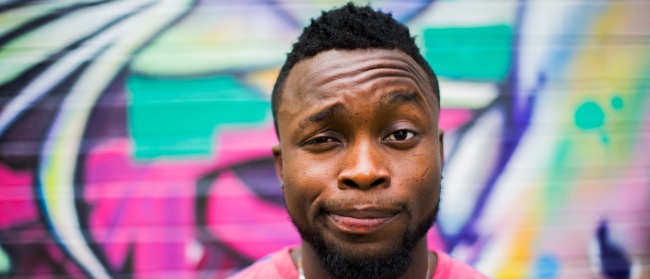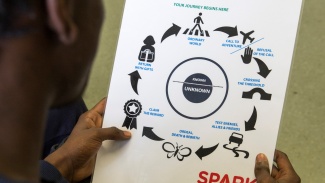UnlockingInnerHeroes
Earlier this year we invited our supporters, Rathbones Investment Management Ltd, to come and experience our prison coaching programme for themselves. A few members of the Rathbones team took part in a Hero’s Journey™ workshop, our structured life coaching programme for young people aged 15 to 25, that builds their motivation to change, decreases in-prison violence and ultimately reduces reoffending.
Libby Barrett, an Investment Manager at Rathbones, wrote about the team’s experience for the summer edition of Rathbones Review.
Prison is frightening, but a third of young men who are sent there have been in residential care and know how tough life can be — 90% have experienced neglect or abuse, 32% have a learning disability and 37% arrive with a drug problem. While prison is frightening, the outside world is worse. With nowhere to stay when they leave and no imminent prospect of work, many find it hard not to slip back to their old life — the estate, gangs, drugs and crime.
If rehabilitation is a goal of an enlightened penal system, prison doesn’t work: 97% of prisoners say they want to leave crime behind, yet 45% will reoffend within a year (67% for 15 to 18 year-olds), rising to 75% after two years. The easy response is to write off young offenders, say they’ve brought it on themselves and look away. But that’s a huge waste of young lives and, beside that, it doesn’t work. The people you want to ignore will be the ones who steal your son’s mobile phone, break into your house and ultimately soak up millions of pounds in criminal justice system resources.
Spark Inside believes that a different approach will produce starkly different outcomes. Founded in 2012 by its CEO, Baillie Aaron (a young Harvard and Cambridge graduate), this ambitious charity is pioneering the use of professional coaching in prisons to reduce reoffending and show young people how to turn their life around. A core principle of life coaching is that people must be empowered to help themselves. Advice and instruction have limited effect; according to the charity, “sustainable transformation can only ever come from within.”
This may sound very ‘touchy feely’, but Spark Inside’s Hero’s Journey™ programme is incredibly powerful. A small group of Rathbones staff, including a senior investment director, participated in a workshop and most found the experience very moving. The programme was devised by Lola Fayemi, who joined Spark Inside as director of coaching in 2013. Based on Joseph Campbell’s well-known model, which underpins many folk tales and films including Star Wars, it challenges participants to look at their life so far and in the future, and ask:
— how do I want my future self to be?
— what is needed to get there?
Participants initially attend three workshops in prison where they work in a group with their peers. The hero’s journey is brought to life with contemporary cultural references to help the participants relate to the challenges they will face and be inspired — in our session, we discussed how 50 Cent, the hugely-successful rapper, escaped his apparent fate of dying young as a drug dealer in New York.
Through the programme, participants learn how to identify and challenge their limiting beliefs and negative self-talk. They develop greater resilience and self-awareness, build a more positive self-identity and identify challenging, but achievable, future goals.
Crucially, Spark Inside has identified that ‘through the gates’ support is most effective. As well as the group workshops, participants are offered up to six one-hour follow-up sessions, leading up to and following their release. The post-release support is crucial: without it, it can seem almost impossible to make the necessary changes.
As with all coaching, the quality of the experience comes as much from the skill of the coach as from the programme. Spark Inside has a small team of experienced professional life coaches, such as Naina Oliver, who brilliantly facilitated the Rathbones session — in just 90 minutes, she encouraged my colleagues and me to face up to some challenging issues. Coaches are engaged on a session-by-session basis. Most also work as corporate life coaches, which subsidises their more vocational work for the charity.
The reoffending rate for those who have been on the course is 10% — the national average is 45% in one year and 75% after two.
The cost of the programme, including three group workshops plus the follow-up one-to-one coaching is £12,000 for six offenders. At just £2,000 per participant for the full journey, it is incredibly cost effective. However, such work is about results and Hero’s Journey™ has so far achieved incredible results. The most recent external evaluation showed a reoffending rate of just 10% — as I’ve already said, the national average is 45%.
Trevor, a beneficiary of Hero’s Journey™ programme, explains how he benefited:
“Spark Inside helps you get an understanding of the problems you face, why you keep facing them, and why you can’t break the cycle of offending. The one-to-one coaching is a conversation with you, about you, and how to help you. Nowhere else in prison are there people there for you, to talk about you, and help you understand yourself better.”
Even those who believe that prison should be about punishment rather than rehabilitation must accept that reducing reoffending is good for selfish reasons alone as the costs to society of low- to medium-level crime are huge. The government certainly agrees. In February, the Home Office announced that the rehabilitation of prisoners would become an objective of prison for the first time ever.
Spark Inside is still operating on a small scale — established in just nine prisons and young offender institutions in the South East, as of February it had delivered 81 Hero’s Journey™ courses to over 250 young people. It wants to reach far more, depending on resources and the support of prison governors, who these days have much greater autonomy in how to achieve reoffending targets. The charity has also developed a systems coaching methodology to reduce tension in prisons between offenders and warders. Again, early data suggests this can be extremely effective.
As with all prison charities, however, the biggest challenge is funding — the rehabilitation of prisoners is hardly glamorous. Spark Inside only gets about a third of its funding from government commissioning, relying mainly on grants and trusts, and major philanthropists. The Rathbone Brothers Foundation was pleased to support the charity as it met our demanding criteria. We hope it continues to grow and gives more young people the tools and self-belief to change their lives.


